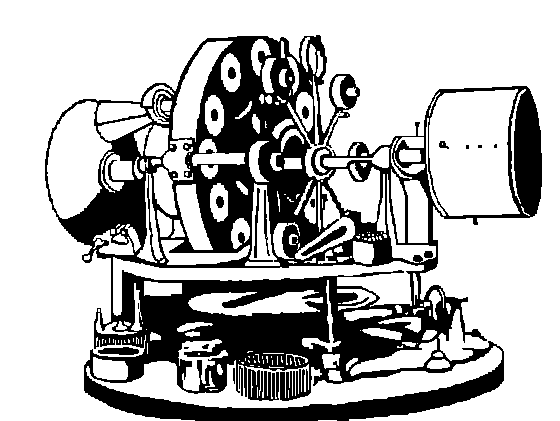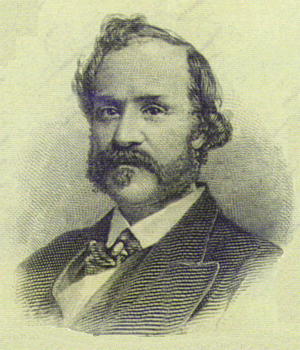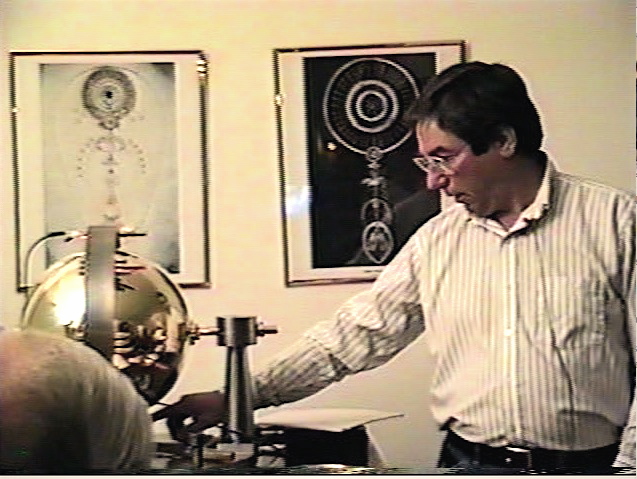| Check out the SVPwiki | SVP Cosmology 2.3 |
In the spring of 1890 Keely succeeded in raising the metal weight composing his airship model, by means of a force still unknown to science. One of his friends stated "When he has gained as perfect control of it as we now have over steam, airships weighing thousands of tons can easily traverse the highways of the air."
"He has gained control of the mysterious polar current to that extent that he has been able to exhibit on the thirds or molecular graduation of the propellor of his airship, 120 revolutions per minute, and on the sixths or atomic graduation, 360 revolutions per minute. He still has the etheric field to conquer."
Keely says "By exciting the metallic mass composing a navigator of any given weight, it may be suspended and propelled. The vibratory neutral negative attraction evolved will bring it into perfect commercial control by keeping it in sympathy with the earths polar stream." This is why he sought to find the sympathetic connection between luminous ether, or inflowing celestial streams, and the radiating or terrestrial streams, which, by their interaction "solar tensions against terrestrial condensations" cause the polar current and its kindred phenomena.
While he used "sympathetic negative attraction" for running machinery, he sought to use for aerial navigation, another force, a "negation" of "sympathetic negative attraction" or the same force that regulates the recession of the planets from each other. This is probably simply polar propulsion, although he terms this elsewhere as gravity.
"The power of the terrestrial propulsive and celestial attractive is to lift and of the celestial propulsive and terrestrial attractive is to descend. Certain polar or antipolar vibrations can intensify either of these qualities so as to cause either of them to predominate. Intensifying the celestial will cause a metallic mass to rise with a speed proportionate to the concentration of the dominant bearing on the negative thirds of its mass chords, thereby inducing high neutral radiation together with celestial attraction."
"An airship of any number of tons weight can, when my system is completed, float off into space with a motion as light as thistledown, or with a velocity out rivaling the cyclone. With the force of corpuscular bombardment its movements can be as varied as is necessary for commercial use at any desired elevation and at any speed." (The Snell Manuscript)
John Ernst Worrell Keely, 1894
"A small instrument, having three gyroscopes as a principal part of its construction, is used to demonstrate the facts of aerial navigation. These gyroscopes are attached to a heavy, inert mass of metal, weighing about one ton. The other part of the apparatus consists of tubes, enclosed in as small a space as possible, being clustered in a circle. These tubes, represent certain chords, which were coincident to the streams of force acting upon the planet, focalizing and defocalizing upon its neutral center. The action upon the molecular structure of the mass lifted was based upon the fact that each molecule in the mass possessed a north and south pole, - more strictly speaking, a positive and negative pole, - situated through the center, formed by the three atoms which compose it. No matter which way the mass of metal is turned, the poles of the molecule point undeviatingly to the polar center of the earth, acting almost exactly as the dip-needle when uninfluenced by extraneous conditions, electrical and otherwise. The rotation of the discs of the gyroscopes produces an action upon the molecules of the mass to be lifted, reversing their poles, causing repulsion from the earth in the same way as like poles of a magnet repel each other. This repulsion can be diminished and increased according as the mechanical conditions are operated. By operating the three discs, starting them at full speed, then touching two of them, so as to bring them, according to the tone they represented by their rotation, to a certain vibratory ratio, the weight then slowly sways from side to side leaves the floor, rising several feet in the air, remaining in that position, and as the discs gradually decrease their speed of rotation the weight sinks to the floor, settling down as lightly as thistledown. Where one molecule can be lifted, there need be no limit as to the number in a structure that may be operated upon as easily as one. The vessel in contemplation, the aerial navigator, will be over two hundred feet long, over sixty feet in diameter, tapering at both ends to a point, made of polished steel, and will be capable of being driven under the power of depolar repulsion, at the rate of three hundred miles an hour. It can be far more easily controlled than any instrument now in use for any phase of transit. Another very remarkable feature connected with this system of aerial navigation, is that the vessel is not buoyed up or floated in the air through the medium of the air, so that if there were no atmosphere it would float just as readily; hence, under mechanical conditions most certainly capable of production, involving massive strength of resistance to interstellar vacuity this can be made capable of navigating even the remote depth of space, positions between planets where polarity changes being controlled by other adjuncts of concentration for that purpose.
Safely enclosed within this structure, a man possessing the chemical knowledge these new laws give, with sufficient supply of material from which to make oxygen, by the enormously increased rate of speed attained by such navigator where atmospheric friction is avoided, the time occupied in traveling from one planet to another would be amazingly brief, and one can travel to other planets in this system of worlds as easily as the same ship could navigate the depths of the ocean.
The great obstacle hitherto preventing the solution of this problem has been the strength of structure needed under conditions above presented. With this knowledge of matter, the size of structure is unimportant; the heaviest can be as easily controlled as the lightest."
From Dashed Against the Rock,, by William Colville, 1894.
 Keelys Acoustic Levitating Device |
John Ernst Worrell Keely, 1894
A small instrument, having three gyroscopes as a principal part of its construction, is used to demonstrate the facts of aerial navigation. These gyroscopes are attached to a heavy, inert mass of metal, weighing about one ton. The other part of the apparatus consists of tubes, enclosed in as small a space as possible, being clustered in a circle. These tubes, represent certain chords, which were coincident to the streams of force acting upon the planet, focalizing and defocalizing upon its neutral center. The action upon the molecular structure of the mass lifted was based upon the fact that each molecule in the mass possessed a north and south pole, - more strictly speaking, a positive and negative pole, - situated through the center, formed by the three atoms which compose it. No matter which way the mass of metal is turned, the poles of the molecule point undeviatingly to the polar center of the earth, acting almost exactly as the dip-needle when uninfluenced by extraneous conditions, electrical and otherwise. The rotation of the discs of the gyroscopes produces an action upon the molecules of the mass to be lifted, reversing their poles, causing repulsion from the earth in the same way as like poles of a magnet repel each other. This repulsion can be diminished and increased according as the mechanical conditions are operated. By operating the three discs, starting them at full speed, then touching two of them, so as to bring them, according to the tone they represented by their rotation, to a certain vibratory ratio, the weight then slowly sways from side to side leaves the floor, rising several feet in the air, remaining in that position, and as the discs gradually decrease their speed of rotation the wieght sinks to the floor, settling down as lightly as thistle-down. Where one molecule can be lifted, there need be no limit as to the number in a structure that may be operated upon as easily as one. The vessel in contemplation, the aerial navigator, will be over two hundred feet long, over sixty feet in diameter, tapering at both ends to a point, made of polished steel, and will be capable of being driven under the power of depolar repulsion, at the rate of three hundred miles an hour. It can be far more easily controlled than any instrument now in use for any phase of transit. Another very remarkable feature connected with this system of aerial navigation, is that the vessel is not bouyed up or floated in the air through the medium of the air, so that if there were no atmosphere it would float just as readily; hence, under mechanical conditions most certainly capable of production, involving massive strength of resistance to interstellar vacuity this can be made capable of navigating even the remote depth of space, positions between planets where polarity changes being controlled by other adjuncts of concentration for that purpose.
Safely enclosed within this structure, a man possessing the chemical knowledge these new laws give, with sufficient supply of material from which to make oxygen, by the enormously increased rate of speed attained by such navigator where atmospheric friction is avoided, the time occupied in traveling from one planet to another would be amazingly brief, and one can travel to other planets in this system of worlds as easily as the same ship could navigate the depths of the ocean.
The great obstacle hitherto preventing the solution of this problem has been the strength of structure needed under conditions above presented. With this knowledge of matter, the size of structure is unimportant; the heaviest can be as easily controlled as the lightest.
From Dashed Against the Rock, by William Colville, 1894.
 |
||
 |